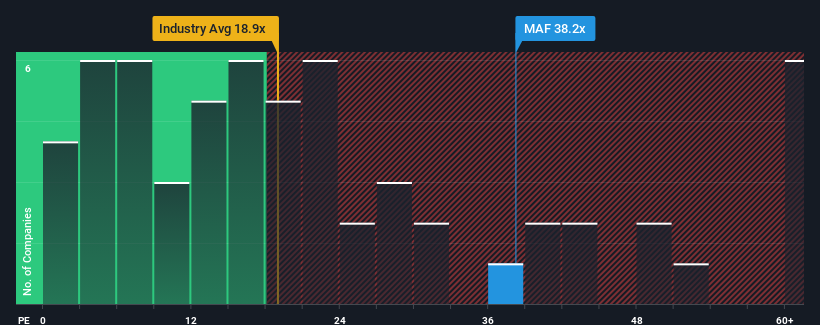- Australia
- /
- Capital Markets
- /
- ASX:MAF
Getting In Cheap On MA Financial Group Limited (ASX:MAF) Might Be Difficult

With a price-to-earnings (or "P/E") ratio of 38.2x MA Financial Group Limited (ASX:MAF) may be sending very bearish signals at the moment, given that almost half of all companies in Australia have P/E ratios under 19x and even P/E's lower than 11x are not unusual. However, the P/E might be quite high for a reason and it requires further investigation to determine if it's justified.
MA Financial Group hasn't been tracking well recently as its declining earnings compare poorly to other companies, which have seen some growth on average. It might be that many expect the dour earnings performance to recover substantially, which has kept the P/E from collapsing. If not, then existing shareholders may be extremely nervous about the viability of the share price.
See our latest analysis for MA Financial Group

Is There Enough Growth For MA Financial Group?
There's an inherent assumption that a company should far outperform the market for P/E ratios like MA Financial Group's to be considered reasonable.
Retrospectively, the last year delivered a frustrating 40% decrease to the company's bottom line. This means it has also seen a slide in earnings over the longer-term as EPS is down 32% in total over the last three years. Therefore, it's fair to say the earnings growth recently has been undesirable for the company.
Shifting to the future, estimates from the four analysts covering the company suggest earnings should grow by 38% per annum over the next three years. Meanwhile, the rest of the market is forecast to only expand by 19% each year, which is noticeably less attractive.
In light of this, it's understandable that MA Financial Group's P/E sits above the majority of other companies. It seems most investors are expecting this strong future growth and are willing to pay more for the stock.
The Bottom Line On MA Financial Group's P/E
Generally, our preference is to limit the use of the price-to-earnings ratio to establishing what the market thinks about the overall health of a company.
As we suspected, our examination of MA Financial Group's analyst forecasts revealed that its superior earnings outlook is contributing to its high P/E. At this stage investors feel the potential for a deterioration in earnings isn't great enough to justify a lower P/E ratio. Unless these conditions change, they will continue to provide strong support to the share price.
Plus, you should also learn about these 4 warning signs we've spotted with MA Financial Group (including 1 which is a bit unpleasant).
You might be able to find a better investment than MA Financial Group. If you want a selection of possible candidates, check out this free list of interesting companies that trade on a low P/E (but have proven they can grow earnings).
New: Manage All Your Stock Portfolios in One Place
We've created the ultimate portfolio companion for stock investors, and it's free.
• Connect an unlimited number of Portfolios and see your total in one currency
• Be alerted to new Warning Signs or Risks via email or mobile
• Track the Fair Value of your stocks
Have feedback on this article? Concerned about the content? Get in touch with us directly. Alternatively, email editorial-team (at) simplywallst.com.
This article by Simply Wall St is general in nature. We provide commentary based on historical data and analyst forecasts only using an unbiased methodology and our articles are not intended to be financial advice. It does not constitute a recommendation to buy or sell any stock, and does not take account of your objectives, or your financial situation. We aim to bring you long-term focused analysis driven by fundamental data. Note that our analysis may not factor in the latest price-sensitive company announcements or qualitative material. Simply Wall St has no position in any stocks mentioned.
About ASX:MAF
Solid track record with moderate growth potential.
Similar Companies
Market Insights
Community Narratives



